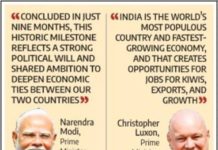https://www.moneycontrol.com/news/business/economy/opinion-for-farmers-to-make-money-the-government-should-move-out-of-procurement-2830791.html
Farming, politicians and pricing
Why can’t the government benchmark farmer incomes as a percentage of market prices? Why can’t the Verghese Kurien formula be extended to all crops?
The right way would be to adopt the vision propounded and implemented by the late Verghese Kurien of Amul and National Dairy Development Board (NDDB) fame. He wanted to ensure that farmers got 70 percent of the market value of his produce (in Gujarat, today, the farmer gets over 80 percent of the market value of milk). Why can’t the government benchmark farmer incomes as a percentage of market prices instead? Why can’t the Kurien formula be extended to all crops?
The other alternative is adopting the MS Swaminathan recommendation that the farmer should get 50 percent more than the cost of his inputs. At least, that will leave some money with politicians. Moreover, since the government decides the cost of inputs, money management powers remain with the government. That is why, predictably, farmers are unhappy with this formula. They say the government calculates the cost of inputs in a manner that is not fair.
There is another flaw in the cost-plus-50 percent formula. It assumes that someone will buy the produce. There are no standards laid down about the quality of produce and who will purchase the produce in case the farmer cannot find a buyer.
Having the government as a purchaser would only make the government the biggest distorter of market prices. Look what it has done with wheat and rice. These are the only two crops that the government actually procures in significant quantities. It purchases even more than it can store in its warehouses. As a result, much of the grain procured, gets damaged because of pests and exposure to weather.
Ideally, the government must move out of procurement altogether. This was evident when an experiment was conducted a decade ago by the then agriculture minister Sharad Pawar. He asked the two largest warehousing companies attached to commodity exchanges (NCMSL and NBHC) to procure grain from the remotest of areas (and with stiff conditions attached) and gave them a difficult target to meet. In record time, the two companies procured grain at lower cost of operation than the Food Corporation of India (FCI). The government got alarmed. It did not publish its findings. And the experiment was not repeated.
When the government procures, there is bound to be corruption and leakages. But that is how politicians grant favours. Hence, the FCI and the state warehousing corporations are not being dispensed with. Ideally, the government should allow warehousing companies to procure grain. The FCI should purchase the grain it needs from such warehousing companies, and sell the required amount to public distribution system (PDS) shops.
What the government should do is to allow for price discovery through commodity markets and not ban trading based on caprice and conniving. But then are we expecting the politicians to change their spots?
Result: Take all government assurances on farm pricing with a barrel of salt. Farm incomes must grow. But they will grow through contract farming, commodity exchanges and through ancillary businesses like dairy farming, animal husbandry, aqua farming and meat?
May be that is what the government ought to be working on. But can it forget its animal slaughter and animal export bans?










































COMMENTS